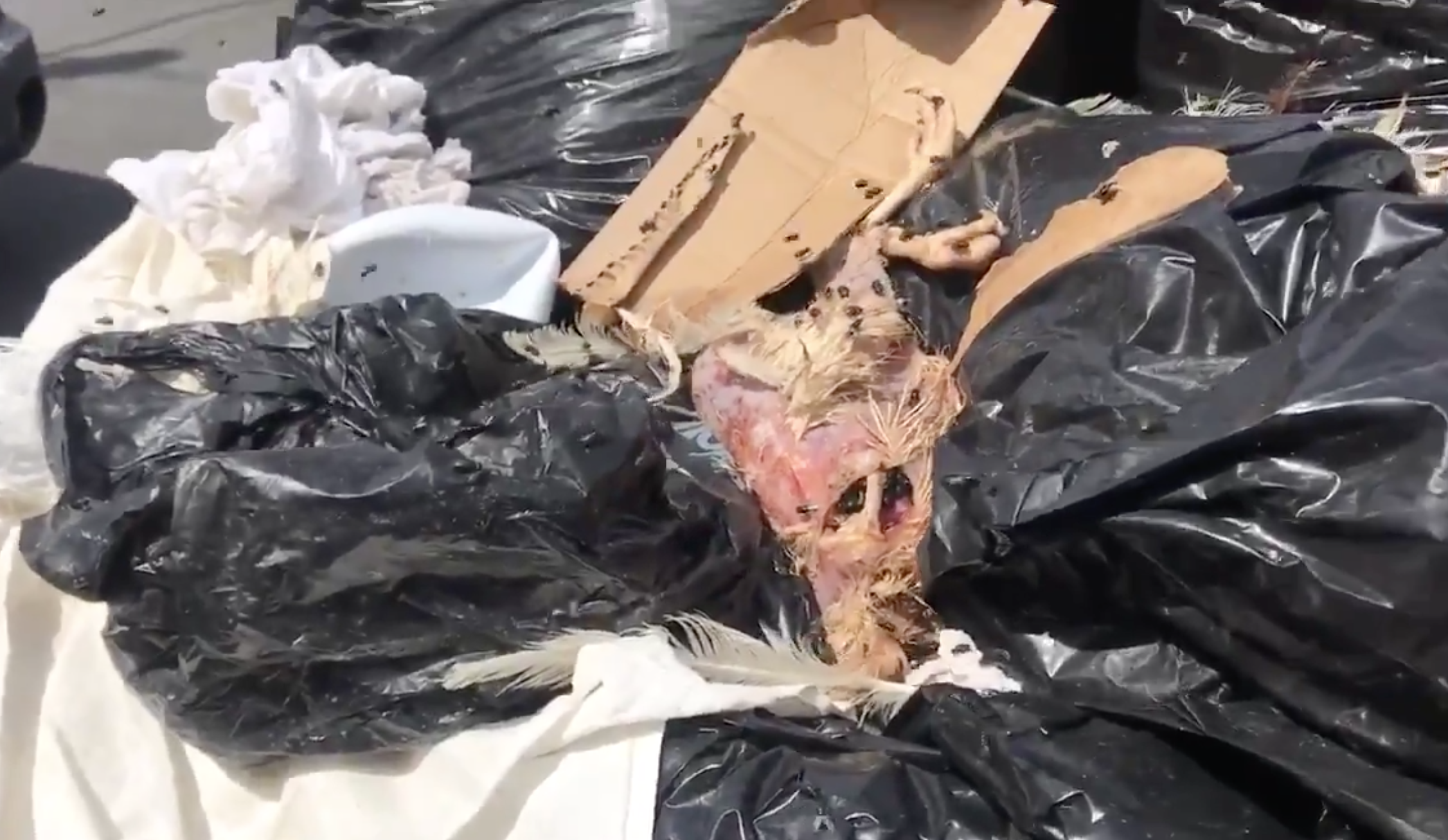Blood and guts outside Jamaica ‘wet markets’ fuel health concerns
/A dead chicken attracts a swarm of flies in a dumpster outside two Jamaica slaughterhouses, located near the Jamaica Center subway station. Image via NYCLASS
By David Brand
Rivulets of blood and piles of putrid poultry parts outside two Jamaica slaughterhouses have spurred calls for a ban on so-called “wet markets” — or, at the very least, stronger oversight of how the establishments dispose of their animal carcasses.
In a video filmed Aug. 11, animal rights activist Edita Birnkrant highlighted the gore along the sidewalk outside Almedina Live Poultry and Aziz Slaughterhouse near the Jamaica Center subway station.
“This is typical conditions on a public city street with blood, filth, feces everywhere,” she said as she filmed the feathery sidewalk.
Birnkrant, the executive director of New Yorkers for Clean, Livable, and Safe Streets, or NYCLASS, said the unsanitary conditions inside and outside slaughterhouses like Almedina and Aziz can breed disease and put New Yorkers’ health at risk. Scientists and public health experts say COVID-19 likely originated inside a wet market in China, where animals are packed tightly together in filthy conditions.
The same conditions are present at markets in New York City, according to advocates and some local lawmakers.
“These live animal wet markets represent a perfect storm for zoonotic animal-to-human disease transmission,” said author and physician Dr. Michael Greger in a July report on slaughterhouse conditions produced by NowThis.
In another video shot by Birnkrant outside Almedina and Aziz on May 26, black flies swarm a chicken carcass lying on top of a stuffed dumpster. A chicken head pokes out of a garbage bag while more flies hover above a pool of blood streaming toward the sewer grate down the block.
We commend @NYGovCuomo for signing the moratorium on new live slaughter markets, by @SenGianaris + @DavidWeprin but we need to do more. Over 80 slaughter markets operate NOW and are health hazards to communities. A.10399/S.8291 shuts down these breeding grounds for disease. pic.twitter.com/gXBrTUePNs
— NYCLASS (@nyclass) August 11, 2020
A July 2019 video posted on Facebook shows multiple dead chickens lying on top of garbage bags as flies congregate outside Almedina and Aziz. ‘The smell right now is insane,” said the cameraman, from the organization Brooklyn-Queens Animal Save. “The smell is making us almost want to throw up.”
A city Health Department spokesperson said they do not monitor sidewalk conditions and referred questions to the Department of Sanitation.
Sanitation spokesperson Joshua Goodman said the agency issues violations to businesses that do not keep their sidewalks “clean and sanitary, especially with regards to any bio-hazardous material.” Goodman encouraged New Yorkers to report disgusting or dangerous sidewalk conditions to 311.
On Thursday, an enforcement official visited the Jamaica slaughterhouses on Beaver Road and found the outdoor conditions to be clean, according to the agency. The sites have been issued citations in the past for blocking sidewalks, but none were related to blood and guts spilled on the sidewalk.
When contacted Thursday, staff at both Almedina and Aziz markets suggested the blood and exposed animal parts came from the other location.
Activists from the organization NYCLASS call on the state to ban “wet markets” — live animal slaughterhouses — during the COVID-19 pandemic at a rally in Ridgewood. Conditions outside some markets have spurred the movement for stronger health regulations. Photo courtesy of NYCLASS
A bill before the state legislature would take drastic steps to prevent such conditions in the future.
Manhattan Assemblymember Linda Rosenthal introduced legislation that would close the roughly 80 state-licensed slaughterhouses in New York City and create a task force to examine conditions at facilities where animals are stored, slaughtered and sold.
A separate 2008 law, renewed Monday, bans the creation of new slaughterhouses within 1,500 feet of residential zones in New York City.
That measure’s sponsor, Queens Assemblymember David Weprin, said the moratorium on new wet markets came in response to constituent concerns more than a dozen years ago.
“Residents constantly complained about the unbearable odor emanated from these markets,” he said.
He said he does not support the ban on existing wet markets because of the potential impact on Muslim and Jewish New Yorkers. Aziz and Almedina, the Jamaica slaughterhouses, both kill and butcher animals to comply with Halal standards.
“I’m not supporting that bill because it would shut down halal business and kosher businesses and make it hard for a lot of my constituents to get food,” Weprin said.
But Birnkrant, the NYCLASS director, said ensuring safe conditions at slaughterhouses will actually improve the health of New Yorkers who follow halal or kosher regulations.
“Halal and kosher meat can be purchased at many other markets that do not put the public safety and health of all New Yorkers at such high risk by operating slaughterhouses in densely populated neighborhoods, often disregarding basic health, sanitation and animal welfare regulations,” she said.





